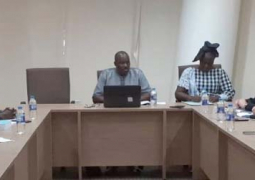
Speaking at the ceremony held at GTHI along MDI Road in Kanifing, Cherno Marenah, Solicitor General, said the demand of businesses in the country has increased since the Single Window Business Registry (SWBR) system was introduced.
This was a concern to the Gambia government, he said, adding that this was why they focused on improving the industry and making it convenient for all, because business is one of the things which keep an economy growing.
“The Gambia will soon join in the registration of trademarks to boost
our business industry,” he stated.
In his presentation, Morro Krubally, CEO /senior consultant, MaXXis Consulting Firm, said the business plan was for the creation of an autonomous Single Business and Intellectual Property Registry in The Gambia.
He added that the business plan is one of the deliverables of the feasibility study; Financial Analysis on Feasibility of Establishing an Autonomous Business and Intellectual Property Registry.
According to Mr Krubally, the Ministry of Justice, which houses both the business registration function and the intellectual property registration function in collaboration with The Gambia Growth and Competitiveness Project, sanctioned the assignment with funding grant from the GCP.
The GCP through its component on improving the business environment in The Gambia, funded the establishment of the SWBR office, he said, adding that the single window registration office is another take on the one-stop-shop concept, where business registration services could be obtained at one central point, facilitating the ease of doing business.
The aim of the study is to provide a detailed financial feasibility analysis that would guide in formulating future strategies for an autonomous operation for the SWBR and intellectual property registry.
Mr Krubally explained that the major objective of the plan is to carry out an objective feasibility assessment on the financial sustainability of establishing an autonomous SWB and intellectual property registry.
It was also to identify potential revenue sources, and how they could be sustained for smooth operations of the SWB and intellectual property registry, he added.
Mr Krubally further indicated that the primary function of the registry is to engage in business and intellectual property registration for national and international entrepreneurs, small and medium enterprises as well as corporate businesses.
He stated that the registry is expected to employ all modern ways to market its services, leading to a money generation entity, and the financial expectation is that the business could maintain itself for many years to come.
On 19 November 2015, he added, the consultant along with two SWBR employees embarked on a regional tour with the first stop made at the governor’s office in Brikama, where they conducted a sensitisation workshop in which the consultant presented the study and its aims and objectives.
He said a similar meeting was held in Upper River Region, which was attended by the governor of URR, the two regional chiefs and other key stakeholders.
The consultant and his team also travelled to Central River Region for a meeting with the governor and TAC stakeholders.
Tamsir Manga, project coordinator of GGCP, and Lamin Touray, registrar of companies, both expressed similar sentiments on the importance of the validation exercise.


